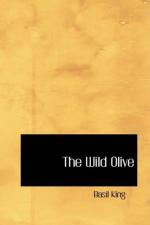All at once they emerged on a tiny clearing—a grassy ledge on the slope. Through the starlight he could see the hillside break away steeply into a vaporous gorge, while above him the mountain raised a black dome amid the serried points of the sky-line. The dryad-like creature beckoned him forward with her scarf, until suddenly she stopped with the decisive pause of one who has reached her goal. Coming up with her, he saw her unlock the door of a small cabin, which had hitherto not detached itself from the surrounding darkness.
“Go in,” she whispered. “Don’t strike a light. There are biscuits somewhere, in a box. Grope for them. There’s a couch in a corner.”
Without allowing him to speak, she forced him gently over the threshold and closed the door upon him. Standing inside in the darkness, he heard the grating of her key in the lock, and the rustle of her skirts as she sped away.
III
From the heavy sleep of fatigue Ford woke with the twittering of birds that announces the dawn. His first thought before opening his eyes, that he was still in his cell, was dispelled by the silky touch of the Sorrento rugs on which he lay. He fingered them again and again in a kind of wonder, while his still half-slumbering senses struggled for the memory of what had happened, and the realization of where he was. When at last he was able to reconstruct the events of the preceding night, he raised himself on his elbow and peered about him in the dim morning twilight.
The object he discerned most readily was an easel, giving him the secret of his refuge. On the wooden walls of the cabin, which was fairly spacious, water-color sketches were pinned at intervals, while on the mantelpiece above a bricked fireplace one or two stood framed. Over the mantelpiece a pair of snow-shoes were crossed as decorations, between which hung a view of the city of Quebec. On a lay-figure in a corner was thrown carelessly the sort of blanket coat worn by Canadians during winter sports. Paints and palettes were arranged on a table by the wall, and on a desk in the middle of the room were writing materials and books. More books stood in a small suspended bookcase. Beside a comfortable reading-chair one or two magazines lay on the floor. His gaze travelled last to the large apron, or pinafore, on a peg fastened in a door immediately beside his couch. The door suggested an inner room, and he got up promptly to explore it. It proved to be cramped and dark, lighted only from the larger apartment, which in its turn had but the one high north window of the ordinary studio. The small room was little more than a shed or “lean-to”, serving the purposes of kitchen and storeroom combined. The arrangements of the whole cabin showed that some one had built it with a view to passing in seclusion a few days at a time without forsaking the simpler amenities of civilized life; and it was clear that that “some one” was a woman. What interested Ford chiefly for the moment was the discovery of a sealed glass jar of water, from which he was able to slake his twenty hours’ thirst.




